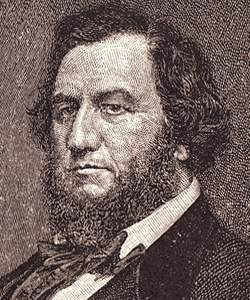Herschel Vespasian Johnson (American National Biography)
Johnson declined to seek a seat in the Provisional Congress but was pleased with its redesign of the Constitution and with the selection of Jefferson Davis and Alexander Stephens for the top positions in the new government...Johnson once again answered his state's call in November 1862, when the legislature…selected him to fill the Confederate Senate seat vacated by John W. Lewis. Johnson was elected to a full term the following autumn and served in the Confederate Congress for the remainder of the war. Although he differed with Davis "in several particulars," Johnson continued to support him and chastised Stephens and other Georgians for their open criticisms. As a legislator, Johnson's voting record was consistent with states' rights doctrine, opposing conscription, a supreme court, and suspension of the writ of habeas corpus.
Herschel Johnson (Appleton’s)
Herschel Vespasian Johnson (Congressional Biographical Dictionary)
Herschel Vespasian Johnson (Dictionary of American Biography)
He was elected by the Democrats to the governorship of Georgia and served two terms, 1853-1857. While he deplored the resort to force in the territory of Kansas by both the advocates and opponents of slavery, he supported the Kansas-Nebraska Act of 1854. Writing to a group of influential Northern men in regard to the extension of slavery into the territories, he said: “The South does not desire to increase the slave power in the government for the purpose of aggrandizement. She rather desires to retain her power – preserve an equilibrium – to enable her to counteract aggression under the forms of legislation.”
Herschel Vespasian Johnson (New Tork Times)
HERSCHEL V. JOHNSON
The Hon. Herschel V. Johnson died at his home in Jefferson County, Ga., Monday night, at the age of 68 years. He was a native of Georgia, having been born in Burke County, Sept. 18, 1812. After being graduated at the University of Georgia in 1834, he adopted the profession of law, and became prominent in politics. In 1844 he was a Presidential Elector, and in 1848 was appointed United States Senator, to fill a vacancy. On the expiration of his term, in 1849, he was elected Judge of the Superior Court, and in 1853 became Governor of Georgia, an office which he held for four years. He next came prominently before the country in 1860, when he was nominated by the Democrats for Vice-President, on the ticket with Stephen A. Douglas. Being defeated, he became an anti-secession advocate, and, in the Georgia Convention of 1861, vigorously opposed the policy of leaving the Union. In 1863 he was chosen a member of the Confederate Senate, and in 1865 presided over the State Constitutional Convention. The following year he attended the “National Union Convention,” in Philadelphia, and was elected a United States Senator by the Georgia Legislature, but was not permitted to take his seat. In 1873 he became Circuit Judge of the State, a position which he held till his death.





